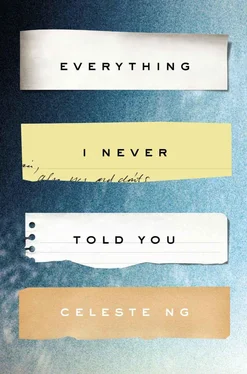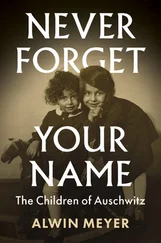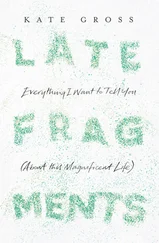James, who should have loved astronauts — what were they but modern cowboys, after all, venturing into the newest frontier? — did not know any of these things. Tangled in his thoughts, Marilyn’s torn-up note pressed to his heart, he saw his son’s new obsession through the other end of the telescope. The astronauts, far off in the sky, were mere specks. Two little men in a sardine can, tinkering with nuts and bolts, while here on earth people were disappearing, even dying, and others were struggling just to stay alive one more day. So frivolous, so ridiculous: actors playing dress-up, strung on wires, pretending to be brave. Dancing with their feet above their heads. Nath, mesmerized, stared at the screen all day with a serene smile, and James felt a hot resentful flare in his gullet.
On Sunday evening, Nath said, “Daddy, can you believe people can go practically to the moon and still come back ?” and James slapped him, so hard Nath’s teeth rattled. “Shut up about that nonsense,” he said. “How can you think about things like that when—”
He had never hit Nath before, and he never would again. But something between them had already broken. Nath, clutching his cheek, darted out of the room, as did Lydia, and James, left alone in the living room with the image of his son’s shocked, reddening eyes, kicked the television to the floor in a burst of glass and sparks. And although he took the children on a special trip to Decker’s Department Store on Monday to buy another, he would never again think of astronauts, of space, without recoiling, as if shielding his eyes from shards of glass.
Nath, on the other hand, took down the Encyclopaedia Britannica and began to read: Gravity. Rocket. Propulsion. He began to scan the newspapers for articles about the astronauts, about their next mission. Surreptitiously he clipped them and saved them in a folder, poring over them when he woke up in the night dreaming of his mother. Tented by his blanket, he pulled a flashlight from under his pillow and reread the articles in order, memorizing every detail. He learned the name of each launch: Freedom. Aurora. Sigma. He recited the names of the astronauts: Carpenter. Cooper. Grissom. Glenn. By the time he reached the end of the list, he was able to sleep again.
Lydia had nothing to keep her mind off the mother-shaped hole in her world, and with Nath distracted by docking adaptors and splashdowns and apogees, she noticed something: the house smelled different without her mother in it. Once she noticed this, she could not stop noticing. At night she dreamed terrible things: she was crawling with spiders, she was tied up with snakes, she was drowning in a teacup. Sometimes, when she woke in the dark, she could hear the creak of the sofa springs downstairs as their father turned over, then turned again. Those nights, she never fell back asleep again, and the days grew sticky and thick, like syrup.
Only one thing in the house still reminded Lydia of her mother: the big red cookbook. While her father locked himself in his office and Nath bent his head over the encyclopedia, she would go into the kitchen and take it down from the counter. At five, she could already read some — though not nearly as well as Nath — and she sounded out the recipes: Chocolate Joy Cake. Olive Loaf. Onion Slim-Dip. Each time she opened the cookbook, the woman on the front looked a little more like her mother — the smile, the folded-back collar, the way she looked not right at you but over your shoulder, just past you. After her mother had come back from Virginia, she had read this book every day: in the afternoon, when Lydia came home from school; in the evening, before Lydia went to bed. In the mornings, sometimes, it was still on the table, as if her mother had been reading it all night. This cookbook, Lydia knew, was her mother’s favorite book, and she leafed through it with the adoration of a devotee touching a Bible.
The third day of July, when her mother had been gone for two months, she curled up in her favorite spot under the dining table with the cookbook once again. That morning, when she and Nath had asked their father about hot dogs and sparklers and s’mores, he had said only, “We’ll see,” and they all knew this meant no. Without their mother, there would be no barbeques, no lemonade, no walking down to the lake to watch the fireworks. There would be nothing but peanut butter and jelly and the house with the curtains pulled shut. She flipped the pages, looking at the photos of cream pies and cookie houses and standing rib roasts. And, there, on one page: a line drawn down the side. She sounded out the words.
What mother doesn’t love to cook with her little girl?
Beneath that:
And what little girl doesn’t love learning with Mom?
Little bumps pocked the page all over, as if it had been out in the rain, and Lydia stroked them like Braille with her fingertip. She did not understand what they were until a tear splashed against the page. When she wiped it away, a tiny goose bump remained.
Another formed, then another. Her mother must have cried over this page, too.
It’s not your fault, her father had said, but Lydia knew it was. They’d done something wrong, she and Nath; they’d made her angry somehow. They hadn’t been what she wanted.
If her mother ever came home and told her to finish her milk, she thought, the page wavering to a blur, she would finish her milk. She would brush her teeth without being asked and stop crying when the doctor gave her shots. She would go to sleep the second her mother turned out the light. She would never get sick again. She would do everything her mother told her. Everything her mother wanted.
• • •

Far off in Toledo, Marilyn did not hear the silent promise her young daughter was making. On the third of July, while Lydia huddled beneath the dining table, Marilyn bent over a new book: Advanced Organic Chemistry. Her midterm was in two days, and she had been studying all morning. With her notebook in hand, Marilyn felt like an undergraduate again; even her signature had gone soft and round, like it had been before she married, before her handwriting stiffened and tightened. All the other students in her course were college kids, some diligently trying to get ahead, some reluctantly trying to catch up from failed classes and bad semesters. To her surprise, they treated her no differently than they treated each other: quiet, polite, focused. In the cool lecture hall, they all sketched molecules, labeling them ethyl, methyl, propyl, butyl; at the end of the class, they compared notes and hers were exactly the same: beautiful little hieroglyphs of hexagons and lines. Proof, she told herself, that I’m just as smart as the others. That I belong.
Yet often, when she opened her books, Marilyn’s mind whirled. Equations jumbled and rejumbled, hidden messages jumping out at her. NaOH became Nath, his small face wide-eyed and reproachful. One morning, consulting the periodic table, instead of helium she thought He and James’s face floated up in her mind. Other days, the messages were more subtle: a typo in the textbook—“the common acids, egg . nitric, acetic…”—left her in tears, thinking of hard-boiled, sunny-side up, scrambled. At these times she slipped her fingertips into her pocket for the barrette, the marble, the button. She turned them over and over until again her mind was smooth.
Some days, though, even these talismans lost their power. Two weeks after she left home, she woke in her rented twin bed, her body one sharp ache. Suddenly she felt drowned in the incredible wrongness of the moment, that she should be here, so far away from them. At last, caped in a blanket, she tiptoed to the telephone in the kitchen. It was six forty-one in the morning, but it took only two rings. “Hello?” James had said. A long pause. “Hello?” She said nothing, not daring to speak, just letting that voice soak into her heart. He had sounded hoarse — just static, she told herself, though she did not truly believe this. At last, she pressed the hook down with one finger and held it there, a long time, before replacing the receiver again. All day she listened to that voice in her head, like a familiar and loved lullaby.
Читать дальше













